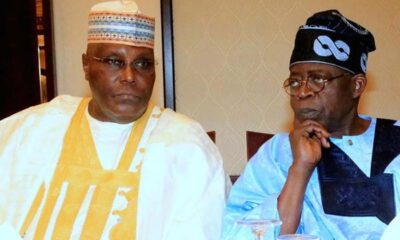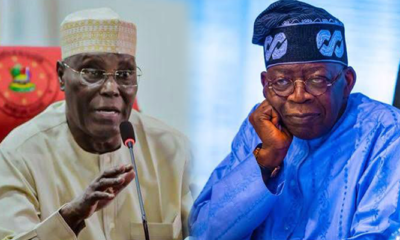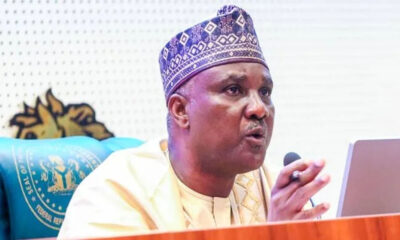News
What I would have done differently as President – Atiku

What I would have done differently as President – Atiku
Former Vice President, Atiku Abubakar, has responded to inquiries from Nigerians about what he would have done differently as President of the country if he had won the 2023 presidential election.
Atiku came second in the 2023 presidential election he contested on the platform of the Peoples Democratic Party (PDP), losing to President Bola Tinubu of the All Progressives Congress (APC).
Peter Obi, who was Atiku’s presidential running mate in the 2019 election came third.
Since Tinubu came to power, the naira has been on a free fall and the economy has nosedived, creating more unemployment, galloping inflation and hardship, with fears of a likely civil unrest.
There were hunger protests in August this year, quelled with tear gas and gunshots fired at protesters by security operatives.
Many protesters were equally arrested including minors, currently standing trials for treason. They face life imprisonment if convicted.
They were brought to the court in the past week underfed, half clothed and hungry. They could not stand in court and collapsed with five of them rushed to the hospital for medical attention.
Atiku, who has launched incessant attacks on what he called the failure of Tinubu’s government, said on Sunday that his approach would have been different, producing positive results.
Atiku said, “I am not the President, Tinubu is. The focus should be on him and not on me or any other.
“I believe that such inquiries distract from the critical questions of what President Bola Tinubu needs to do to save Nigerians from the excruciating pains arising from his trial-and-error economic policies.”
He added, “We would have planned better and more robustly: My journey of reforms would have benefitted from more adequate preparations; more sufficient diagnostic assessment of the country’s conditions; more consultations with key stakeholders; and better ideas for the final destination.
“We would have been guided by my robust reform agenda as encapsulated in ‘My Covenant With Nigerians’, my policy document that sought to, among others, protect our fragile economy against much deeper crisis by preventing business collapse; our document had spelt out policies that were consistent and coherent.”
READ ALSO:
- NMA demands Kano commissioner’s dismissal for assaulting doctor
- Court orders arrest of Dana Group MD over alleged N1.3bn fraud
- NNPP crisis: Kano Gov Yusuf ignores Kwankwaso’s calls, meetings
He added that he would have sequenced his reforms to achieve fiscal and monetary congruence.
“Unleashing reforms to determine an appropriate exchange rate, cost-reflective electricity tariff, and PMS price at one and the same time is certainly an overkill.
“Add CBN’s bullish money tightening spree. As importers of PMS and other petroleum products, removing subsidy on these products without a stable exchange rate would be counterproductive,” he stated.
He also said, “We would have been more strategic in our response to reform fallout. We would not overestimate the efficacy of the reform measures or underestimate the potential costs of reforms.
“I would recognise that reforms could sometimes fail. I would not underestimate the numerous delivery challenges, including the weaknesses of our institutions, and would work assiduously to correct the same.
“I would, as a responsible leader, pause, reflect, and where necessary, review implementation.”
The former Vice President said, “I would have led by example. Any fiscal reform to improve liquidity and the management of our fiscal resources must first eliminate revenue leakages arising from governance, including the cost of running the government and the government procurement process. I (and members of my team) would not have lived in luxury while the citizens wallow in misery.
“We would have communicated more effectively with the people, with civility, tact, and diplomacy. Transparent communication with the public is essential to build public trust, which in turn is important to ensure that the public understands what the government is doing.
“We would have consulted more with all stakeholders to learn, negotiate, adapt, and modify, among other policy goals.
“We would have demonstrated more empathy. My Reforms would wear a human face.
“We would have been more strategic in the design and implementation of reform fallout mitigating measures. I would not run a ‘palliative economy’ yet, we would have robust social protection programme that will offer genuine support to the poor and vulnerable and provide immediate comfort and security to enable them to navigate the stormy seas.”
READ ALSO:
- Domestic worker leads robbers to employer’s house, steal jewellery, cash, laptops, phones (video)
- Bandits shoot activist, abduct his two wives in Katsina
- Iran slams US deployment of B-52 bombers as ‘destabilising’
Specifically, he said his administration “would have undertaken extensive reforms of the public sector institutions to maximise reform impact” focusing on security.
He added he would have “commenced on day one, the reform of security institutions with improved funding, and enhanced welfare. My Policy Document had spelt out a Special Presidential Welfare Initiative for security personnel that we would implement.”
He would have also “adopted alternative approaches to conflict resolution such as diplomacy, intelligence, improved border control, deploying traditional institutions, and good neighbourliness.
“We would have launched an Economic Stimulus Fund (ESF), with an initial investment capacity of approximately US$10 billion to support MSMEs across all economic sectors.”
On funding them, he said he “would have launched a uniquely designed skills-to-job programme that targets all categories of youth, including graduates, early school leavers as well as the massive numbers of uneducated youth who are currently not in education, employment, or training.
“To underscore our commitment to the development of infrastructure, an Infrastructure Development Unit (IDU) directly under the President’s watch would have come into operation.
“The IDU will have a coordinating function and a specific mandate of working with the MDAs to fast track the implementation of the infrastructure reform agenda within the framework provided herein.
“The IDU will hit the ground running in putting the building blocks for our private sector driven Infrastructure Development Fund (IDF) of approximately US$25 billion.
“To engender fiscal efficiency and promote accountability and transparency in public financial management, we would have committed to a review of the current fiscal support to ailing State-Owned enterprises.
“We would’ve also begun a process review of government procurement processes to ensure value-for-money and eliminate all leakages.
“We would have initiated a review of the current utilisation of all borrowed funds and ensured that they were deployed more judiciously.”
Atiku further agreed that removing subsidy was good and he would have given it a priority noting that, he has “always advocated for the removal of subsidy on PMS.”
Consequently, he said he would have implemented “a robust social protection programme that will support the poor in navigating the cost-of-living challenges arising largely from reform implementation.
“We would’ve invested the savings from subsidy withdrawal to strengthen the productive base of the economy through infrastructure maintenance and development; to improve outcomes in education and healthcare delivery; to improve rural infrastructure and support livelihood expansion in agriculture; and develop the skills and entrepreneurial capacity of our youth in order to enhance their access to better economic opportunities.”
On foreign exchange, he said he would have reformed “the operation of the foreign exchange market. Specifically, there was a commitment to eliminate multiple exchange rate windows. The system only served to enrich opportunists, rent-seekers, middlemen, arbitrageurs, and fraudsters.”
He argued that a “fixed exchange rate system was out of the question because it would not be in line with our philosophy of running an open, private sector friendly economy.
“On the other hand, given Nigeria’s underlying economic conditions, adopting a floating exchange rate system would be an overkill.
“We would have encouraged our Central Bank to adopt a gradualist approach to FX management. A managed-floating system would have been a preferred option,” Atiku added.
What I would have done differently as President – Atiku
News
Tinubu to critics: I won’t reduce my cabinet size

Tinubu to critics: I won’t reduce my cabinet size
President Bola Tinubu on Monday unequivocally responded to critics who described his cabinet as “bloated” by saying he is unprepared to reduce the size of his 48-man cabinet.
“I am not ready to shrink” the size of my cabinet, Tinubu said during a media chat at his Bourdillon residence in the highbrow Ikoyi area of Lagos State.
“I am not prepared to bring down the size of my cabinet,” the former Lagos governor said, arguing that “efficiency” has been at the core of his selection of ministers.
The president also said he has no regret removing the petrol subsidy in May 2023, saying Nigeria cannot continue to be Father Christmas to neighbouring countries.
READ ALSO:
- Kolawole Erinle: Appeal court affirms sentence for ex-convict over $1.4m fraud
- We’ve forced Lakurawa terrorists back to Mali, says FG
- Petrol: MRS enforces N935 per litre nationwide
“I don’t have any regrets whatsoever in removing petrol subsidy. We are spending our future, we were just deceiving ourselves, that reform was necessary,” he told reporters.
Tinubu appointed 48 ministers in August 2023, three months after his inauguration. The Senate immediately screened and confirmed the ministers. One of the ministers, Betta Edu, was suspended in January while another, Simon Lalong, moved to the Senate.
There were calls for the President to reshuffle his cabinet as many Nigerians have not been impressed by the performance of some of the ministers, especially in the face of unprecedented inflation, excruciating economic situation and rising insecurity.
In October 2024, Tinubu re-assigned 10 ministers to new ministerial portfolios and appointed seven new ministers for Senate confirmation. He also sacked five of his ministers but critics insist that the President’s cabinet remains large, especially with the creation of a Livestock Ministry with a minister.
Tinubu to critics: I won’t reduce my cabinet size
News
Tinubu: Food stampede incidents, grave error

Tinubu: Food stampede incidents, grave error
..Don’t publicise gifts distribution if you don’t have enough
President Bola Tinubu has described the recent three stampede incidents during distribution of relief materials to children and others as a grave error.
He told people to be more organised and stay away from giving palliative or publicity of the giving if they had insufficient materials.
He stated this during his first presidential media chat on Monday.
The President said he had been sharing palliatives in his Lagos residence for 25 years without any incident and blamed the recent food stampedes in the country on poor organisation.
A total of 35 children died on December 18 during a stampede that happened at a funfair event in Ibadan, Oyo State.
10 people, including children, also died on December 21 in another stampede at the Holy Trinity Catholic Church in the Maitama district of Abuja during the distribution of palliatives.
Another 22 people were reported dead during a rice distribution event at Amaranta Stadium in Ojika, Ihiala LGA, on the same day.
“It’s unfortunate and very sad, but we will continue to learn from our mistakes. I see this as a grave error on the part of the organisers,” he said.
But the President insisted that the incidents should not dampen the “happiness of the season”.
“It is very sad that people are not well organised. We just have to be more disciplined in our society. Condolences to those who lost members, but it is good to give,” Tinubu said.
“I’ve been giving out foodstuff and commodities, including envelopes in Bourdillon, for the last 25 years, and I’ve never experienced this kind of incident because we are organised and disciplined.
“If you know you won’t have enough to give, don’t attempt to give or publicise it.”
The President compared the situation to food banks in countries such as the United States of America (USA) and Britain, noting their structured approach.
“Every society, even in America, has food banks. They have hungry people. In Britain, they have food banks and warehouses, and they are organised. They take turns m lining up and collect,” he added.
News
Tax reforms pro-poor, here to stay, says Tinubu

Tax reforms pro-poor, here to stay, says Tinubu
President Bola Tinubu has said the tax reforms initiated by his administration are here to stay.
He stated this during the presidential media chat on Monday, adding that the new tax deal is pro-poor people.
Tinubu also said the tax reforms were initiated to “eliminate colonial-based assumptions” in the country’s tax environment.
Nigeria, he said, would not continue to use old methods in today’s economy.
The President said those calling for more consultations on the tax reform bills would still do so even if he delayed the presentation.
“Tax reform is here to stay. In today’s economy, we cannot continue to do what we were doing in the past. We can’t retool with old and broken folks,” he said.
“The essence of tax reform is to eliminate colonial-based assumptions in our tax environment
“Every tax situation without outcry is not a tax. You can’t satisfy uniformly the largest community of tax evaders. Look at this tax reform; it is pro-poor. The vulnerable are not to pay taxes.
“The hallmark of a good leader is the ability to do what you have to do at the time it ought to be done. That is my philosophy.”
-

 metro3 days ago
metro3 days agoIbadan stampede: Court sends Ooni’s ex-Queen, Hamzat, other to prison
-
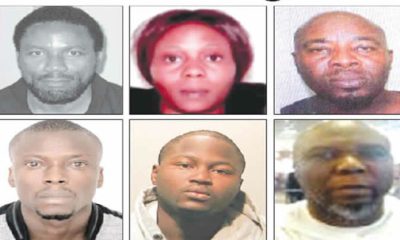
 metro2 days ago
metro2 days agoINTERPOL declares 14 Nigerians wanted for drug, human trafficking
-
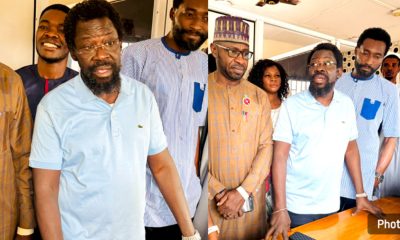
 metro3 days ago
metro3 days ago[UPDATED] I never lied, truth is my weapon against injustice – Dele Farotimi declares after release
-
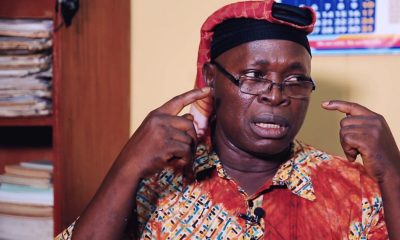
 metro3 days ago
metro3 days agoArrest Abuja, Anambra palliative organisers or set those in Ibadan free — MURIC
-

 metro19 hours ago
metro19 hours agoJigawa State governor loses son 24 hours after mother’s death
-

 metro2 days ago
metro2 days agoIbadan stampede: She was treated like a terrorist, Queen Naomi’s sister says about her condition
-
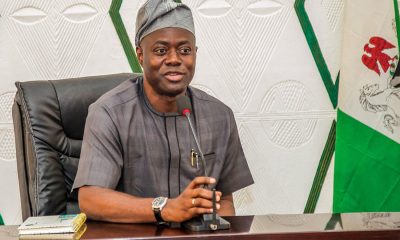
 metro2 days ago
metro2 days agoMakinde speaks on Sharia court controversy in Oyo
-

 Entertainment5 hours ago
Entertainment5 hours agoMultiChoice announces free access to all DSTV channels for 3 days

